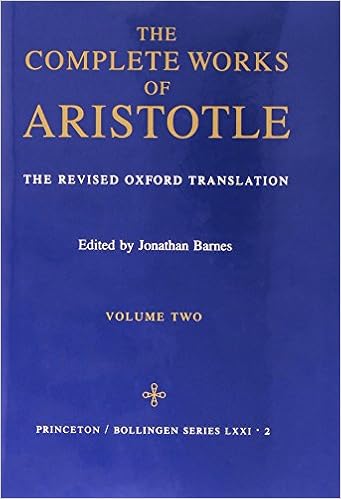
By Laurel Fulkerson
ISBN-10: 0199668892
ISBN-13: 9780199668892
No Regrets: regret in Classical Antiquity is the 1st sustained learn reading the conditions lower than which the sentiments of regret and remorse have been manifested in Greek and Roman public lifestyles. regardless of a still-common idea that regret is a contemporary, monotheistic emotion, it argues that regret did in truth exist in pre-Christian antiquity. by way of discussing the normal lexical denotations of regret, Fulkerson exhibits how its parameters have been fairly assorted from its sleek counterpart. regret within the historic global was once quite often now not expressed by means of high-status members, yet through their inferiors, particularly girls, the younger, and topics of tyrants, nor used to be it redemptive, yet frequently served to teach disorder of personality. via a sequence of examples, particularly poetic, historic, and philosophical texts, this publication demonstrates this used to be so as a result of very excessive price put on consistency of personality within the historical international. High-status males, particularly, confronted consistent demanding situations to their place, and keeping at the very least the looks of uniformity was once necessary to their profitable functioning. The redemptive facets of regret, of studying from one's blunders, have been hence approximately absent within the historical global.
Read Online or Download No Regrets: Remorse in Classical Antiquity PDF
Similar greek & roman books
Download PDF by Hans-Georg Gadamer: Beginning of Knowledge
During this paintings Gadamer reminds us that philosophy for the Greeks used to be not only a question of metaphysics and epistemology yet encompassed cosmology, physics, arithmetic, drugs and the full succeed in of theoretical interest and highbrow mastery. while Gadamer's booklet "The starting of Philosophy" handled the inception of philosophical inquiry, this e-book brings jointly the vast majority of his formerly released yet by no means translated essays at the Presocratics.
Plato, Visit Amazon's Terence Irwin Page, search results,'s Gorgias (Clarendon Plato Series) PDF
The Gorgias is a vibrant advent to principal difficulties of ethical and political philosophy. In resolution to an eloquent assault on morality as conspiration of the susceptible opposed to the robust, Plato develops his personal doctrine, insisting that the advantages of being ethical consistently outweigh any advantages to be received from immorality.
Get New Essays on Ancient Pyrrhonism PDF
Scholarship on historic Pyrrhonism has made super advances during the last 3 a long time, thank you specially to the cautious reexamination of Sextus Empiricus extant corpus. construction in this momentum, the authors of the 8 essays amassed the following learn probably the most vexed and interesting exegetical and philosophical questions posed by way of Sextus presentation of this way of skepticism.
The Complete Works of Aristotle (The Revised Oxford - download pdf or read online
The Oxford Translation of Aristotle used to be initially released in 12 volumes among 1912 and 1954. it truly is universally well-known because the average English model of Aristotle. This revised version comprises the substance of the unique Translation, a bit emended in gentle of modern scholarship; 3 of the unique models were changed through new translations; and a brand new and enlarged choice of Fragments has been additional.
- Simplicius on the Planets and Their Motions: In Defense of a Heresy
- Socrates on friendship and community: reflections on Plato's Symposium, Phaedrus, and Lysis
- Plato on the Human Paradox
- Plato and the Art of Philosophical Writing
Extra resources for No Regrets: Remorse in Classical Antiquity
Example text
The metameletikos does something he will later find fault with, and the liar comes down against something but later does it (we might more usefully call him 28 Aristotle does not list metameleia as one of the pathe (emotions, more or less), but it seems to fit his strictures. 29 Casaubon proposed the supplement ìåôƺÅðôØŒüò, but it is not clear how that improves sense. 10 Introduction the hypocrite). Aristotle’s point is not immediately apparent; we might especially wonder why the metameletikos is in the same category as the hypocrite and the akratic.
80 Briefly, no one of these words always means remorse, though all can, with the appropriate context. This is similar to what B. 81 The verb letalÝkei (metamelei, literally, ‘it is a care later on’, an impersonal verb) and its related nouns ìåôÆìݺåØÆ and ìåôÜìåºïò (metameleia, metamelos: ‘aftercare’)82 are one of the primary ways remorse behaviour is denoted in Greek. There is also an adjective, ìåôÆìåºÅôØŒüò, (metameletikos, ‘inclined to feel metameleia’), rare but of great importance. Etymology provides my definitions, but these words are most often rendered into English by ‘regret’, ‘repent’, and ‘feel remorse for’.
But the second example is surprising: we might be inclined to praise the metameletikos for learning something from his misdeed, but Aristotle does not. 32 30 As Kaster (2005: 154 n. 8) notes, there is no such adjective in pagan Latin. And the word is rare in Greek. 31 Cf. too the important discussion at NE 1150b29, where Aristotle claims that the IŒüºÆóôïò (intemperate man) is ïP ìåôÆìåºÅôØŒüò, for he knows what is wrong as he does it. So there is some aspect of learning or recognition to metameleia.
No Regrets: Remorse in Classical Antiquity by Laurel Fulkerson
by Kenneth
4.0



